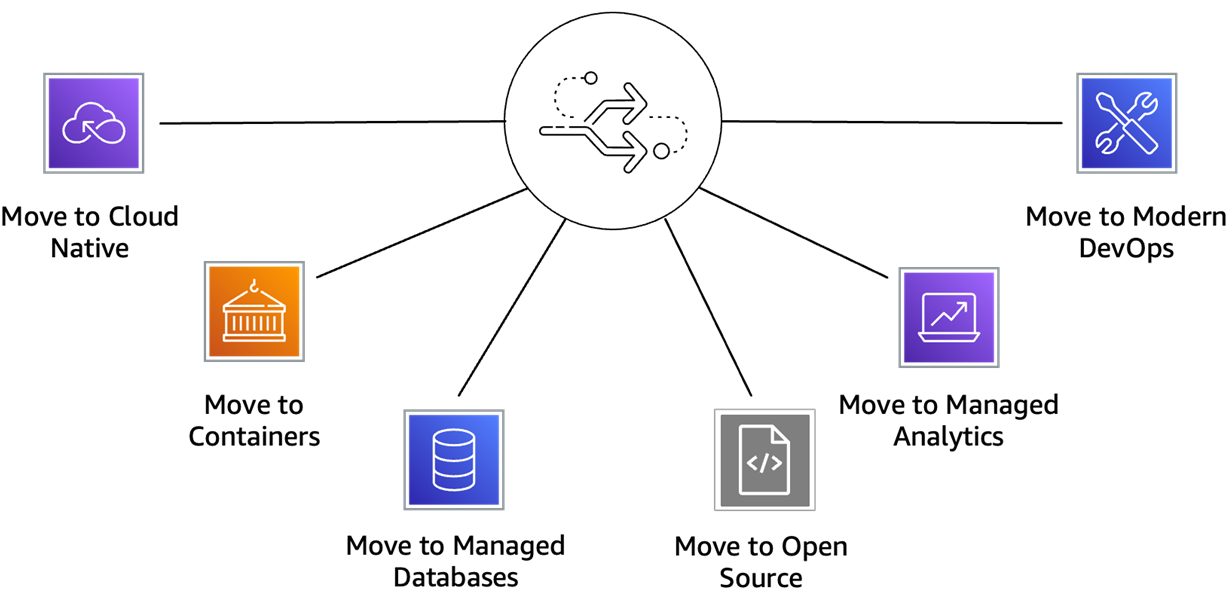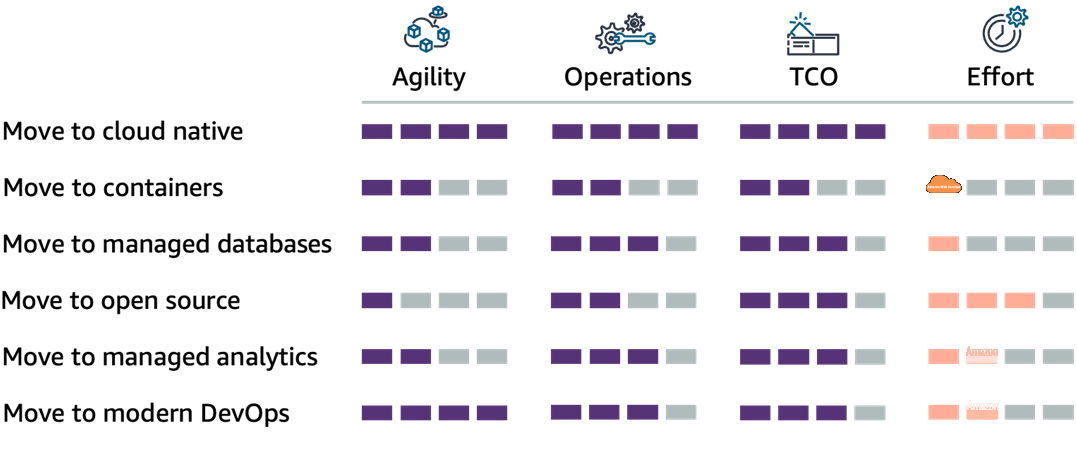我们使用机器学习技术将英文博客翻译为简体中文。您可以点击导航栏中的“中文(简体)”切换到英文版本。
在新的合作伙伴培训系列中了解如何使用规定的途径在 亚马逊云科技 上实现现代化
作者:Erico Penna,合作伙伴解决方案架构师、迁移和现代化 — 亚马逊云科技
作者
: Raghava Kumar Vemu,高级产品经理,培训与认证 — 亚马逊云科技
在首次迁移之后,客户取得了积极成果,例如节省成本、提高员工生产力、运营弹性和业务灵活性。但是,旅程并没有就此止步。
许多客户通过对工作负载进行现代化和优化来继续他们的云采用之旅,从而通过利用 亚马逊云科技 托管服务获得收益。同一项内部研究表明,20% 的客户工作负载遵循 “
现代化的话题与迁移到亚马逊网络服务 (亚马逊云科技) 密切相关。在大多数情况下,这是一个两步行动,客户 1) 使用重新托管方法迁移工作负载,几乎没有变化;或 2) 通过重新架构组件和采用 亚马逊云科技 托管服务,对工作负载进行现代化改造。
客户还可以一步实现现代化,在迁移到 亚马逊云科技 的同时,对应用程序的架构进行重大更改和优化。
每个传统应用程序,无论大小和规模,在设计和架构方面都是独一无二的。有一些常见的途径可以在 亚马逊云科技 上实现现代化,为了帮助客户推动现代化计划,亚马逊云科技 已经确定了六种可能的现代化途径。

图 1 — 亚马逊云科技 现代化路径。
每种现代化路径都会产生不同的商业价值影响,即带来不同的敏捷性水平,高度改善和自动化运营,并对总拥有成本 (TCO) 产生积极影响。从本质上讲,规模越高,影响就越积极。
努力同样重要,可以从低到高水平来衡量——低水平意味着更简单的转换,高意味着更复杂的转换。

图 2 — 业务价值影响。
新的现代化合作伙伴学习之旅
为了帮助客户实现现代化目标,亚马逊云科技 专门为 亚马逊云科技 合作伙伴开设了新的培训课程和学习之旅。
新的数字课程 “
希望提升技能和技术支持的 亚马逊云科技 合作伙伴可以通过六个免费学习计划继续他们的现代化学习之旅,这些计划也可在 亚马逊云科技 Skill Builder 上访问。
请注意,学员应以 “亚马逊云科技 合作伙伴” 的身份登录 亚马逊云科技 Skill Builder,才能访问注册链接并注册。此外,
尽管学习计划没有特定的顺序,但 亚马逊云科技 合作伙伴可以通过注册每项计划来扩展知识范围并将它们结合起来,为客户设计精心设计的现代化解决方案,从而从中受益。
以下是所有可用学习计划的完整列表:
- 移至托管数据库
- 使用亚马逊弹性容器服务 (ECS) 迁移到容器
- 使用亚马逊 Elastic Kubernetes 服务 (EKS) 迁移到容器
- 迁移到云原生无服务器
- 迁移到现代 DevOps
- 迁移到托管分析
其他推荐内容
亚马逊云科技 合作伙伴还可以利用这些其他推荐的现代化资源:
-
基于现代化体验的加速 (ModaX) 博客文章 -
迭代应用程序现代化研讨会 (需要您自己的 亚马逊云科技 账户)
*前述特定亚马逊云科技生成式人工智能相关的服务仅在亚马逊云科技海外区域可用,亚马逊云科技中国仅为帮助您发展海外业务和/或了解行业前沿技术选择推荐该服务。